
The educational administration in Rayong takes a step towards decentralized educational management, bringing relevant stakeholders together in a seminar “Preparing Rayong for the Global Stage”. The focus is on developing crucial foundational skills for working in the modern world, such as reading and comprehension abilities, digital skills, and social-emotional skills.
On September 11, 2023, the Equitable Education Fund (EEF) Thailand, in collaboration with the World Bank, the Rayong Provincial Administration Organization, and the Rayong Inclusive Learning Academy (RILA) organized a seminar titled “Area-Based Education Management in Rayong Province to Prepare Rayong for the Global Stage” at the Novotel Rayong Star Convention Centre, Rayong, The event involved a team of local education stakeholders, including government agencies, private sector, civil society, educational institutions, school administrators, and teachers, as well as individuals with an interest in education in Rayong province, with a total participation of over 150 people on-site.

The Equitable Education Fund (EEF) Thailand implements an area-based education management project aimed at reducing educational disparities and tackling Thailand’s educational inequality issues through a decentralized management approach. The project’s objective is to establish collaborative mechanisms among all stakeholders at the district and provincial levels.
Since the year 2020, the Equitable Education Fund (EEF) Thailand has collaborated with the World Bank, Thammasat University, and the National Statistical Office to develop plans to promote and enhance the skills of youth and informal labor populations. The main objective is to identify and develop foundational skills enhancement systems that enable the target groups to access developmental opportunities, become self-reliant in the modern world, and attain essential skills for the 21st-century workforce. This is achieved through the ‘Adult Skills Assessment in Thailand’ project, which surveys and assesses reading skills, digital skills, and emotional and social skills in the population aged 15-64. The collected data is utilized to formulate education management strategies and enhance the skills of the workforce to meet the demands of the job market, ultimately boosting the country’s competitiveness.

The Equitable Education Fund (EEF) Thailand and the World Bank have collaborated with policy and academic networks to develop the ‘Provincial Adult Skills Assessment in Thailand: ‘PASAT’ project to further their initiatives. The project was launched in 3 pilot provinces – Rayong, Phayao, and Pattani – and aims to leverage international assessment tools to drive provincial-level efforts, including data synthesis, learning promotion design, and policy proposal development in education management for individuals of all ages. The PASAT project leads to organizing area-based educational management seminars in different provinces, starting with Rayong, to prepare the people for the global stage. This seminar provides a platform for various stakeholders to exchange ideas and propose strategies for educational management. The goal is to equip individuals of all ages in Rayong with the skills and readiness to become global citizens and globally competitive personnel with the appropriate skills for the global workforce.

Anan Nakniyom, the Deputy Governor of Rayong Province, emphasized that educational efforts call for collaboration and input from knowledgeable individuals across the spectrum. Hence, Rayong Province established the RILA, responsible for overseeing education for people of all ages. The institute began operating with a clear purpose in 2020. However, preparing individuals for the future through educational management requires continuous communication and dialogue among organizations and individuals at all levels. This includes discussions on how the provincial education policy should be adjusted, especially in light of the significant changes in education today.

Rayong is well-known for its industrial estate, making education related to businesses a vital aspect of the region. Educational institutions must comprehend the skills and qualifications required by businesses. With rapid technological advancements, a large workforce is no longer necessary. Instead, it is essential to have ‘skilled’ individuals who excel in their work, particularly in operating modern machinery. Industrial data for Rayong indicates an increasing number of new industrial factories, resulting in both opportunities and competition. One of the planned approaches by The Office of Industrial Economics in Rayong is to collaborate with educational institutions in implementing a regional education approach, aiming to provide students with the opportunity to learn within educational institutions while simultaneously undergoing internships in businesses. Therefore, upon graduation, individuals will be skilled personnel at a certain level. This approach effectively minimizes the production of individuals who are not suitable for the job, aligning education with the needs of the industry and closing the gap between education and employment.
The Deputy Governor of Rayong stresses the importance of the upcoming seminar as it will facilitate discussions with residents regarding the future development and direction of the industrial sector. To analyze the characteristics of the population within the 15-64 age range, the province needs to determine the workforce qualifications and the number of individuals required. The data obtained from this analysis will help to formulate effective education management strategies and skill development policies for the next phase.

Piya Pitutecha, the Chief Executive of Rayong Province and the Chairman of the RILA, has stated that despite being a small province with a population of hundreds of thousands, Rayong was granted the opportunity by the government to be the hub for the Eastern Seaboard Industrial Estate (ESIE) since 1994. However, it has become apparent that the people of Rayong have not received the opportunities they deserve, mainly due to a lack of readiness concerning the workforce until the arrival of the Eastern Economic Corridor (EEC). Today, Rayong Province needs to re-evaluate its approach to developing individuals capable of seizing opportunities for the province’s growth because currently, Rayong not only has a population from its original inhabitants but also sees an influx of people from other areas for employment.
“In area-based education management, it is crucial to empower young people in a way that aligns with their potential for living and working in the area.’’ Rayong, known for tourism and industry, aims to prepare individuals to reach a global level by focusing on language skills. Our schools in the province have transformed into language centers, particularly focusing on English, Chinese, Japanese, and various other optional languages. This allows children to choose and learn based on their interests, leading to remarkable and transformative outcomes among Rayong’s youth, who are now achieving top-level language scores in the O-NET examination.
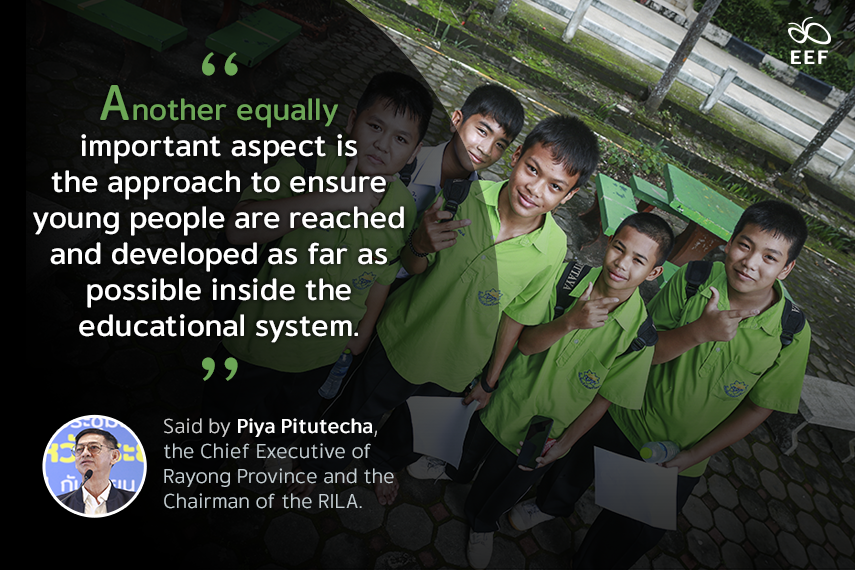
“Another equally important aspect is the approach to ensure young people are reached and developed as far as possible inside the educational system.’’ Schools must be a solid support network willing to throw open doors for every student. The first step in doing this is gathering in-depth information about the children. Every student should have a teacher visit their home so they can get to know them and create tailored support plans. Additionally, schools need to be flexible in easing up on some of the regulations that restrict kids’ ability to learn and grow as individuals.
The head of Rayong Provincial Administrative Organization pointed out that Rayong holds the record for the highest Gross Provincial Product (GPP) per capita in Thailand, indicating that it has more financial resources than other regions. However, the question is how can we make sure that everyone benefits from these opportunities? One of the biggest challenges that Rayong and Thailand are currently facing is an aging population, leading to a decline in the labor and tax-paying populations. This makes it essential to invest in the younger generation and provide them with education and opportunities to reach their full potential. Every child is precious, and if we do not invest in them, Rayong and Thailand will pay a heavy price in the future.
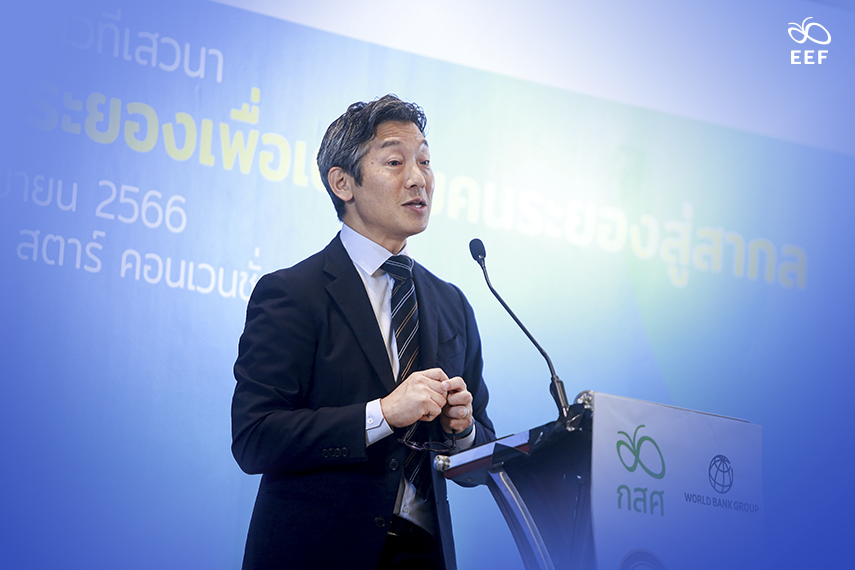
As explained by Koji Miyamoto, a Senior Economist for Education Global Practice at the World Bank, foundational skills in human capital are considered the most valuable asset of a city or a country. Developing the skills of the population is not just a matter of investing in formal or higher education; it requires long-term investment in education from early childhood to the elderly. Furthermore, it involves working with target groups within and outside the formal education system at the same time.
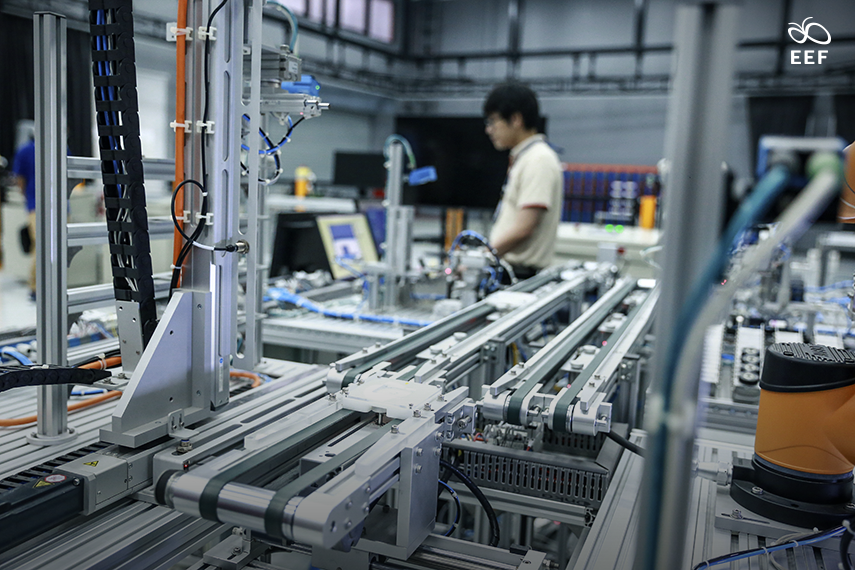
Rayong is an EEC (Eastern Economic Corridor) area, which is recognized for its strategic location and high potential for regional development. Therefore, it is crucial to predict and plan the development of human resources in terms of workforce, so that all stakeholders can produce a sufficient number of skilled individuals to enter the EEC in the future. For this reason, these human resources must possess specific occupational skills that are in demand. However, with the ever-changing global social trends, some occupational skills may only be relevant for a short period, especially with the intervention of digital technology. Therefore, population development should consider both the risks and opportunities, with a focus on fundamental work skills in the new era. These skills will serve as the foundation for accessing opportunities and coping with various risks and changes.
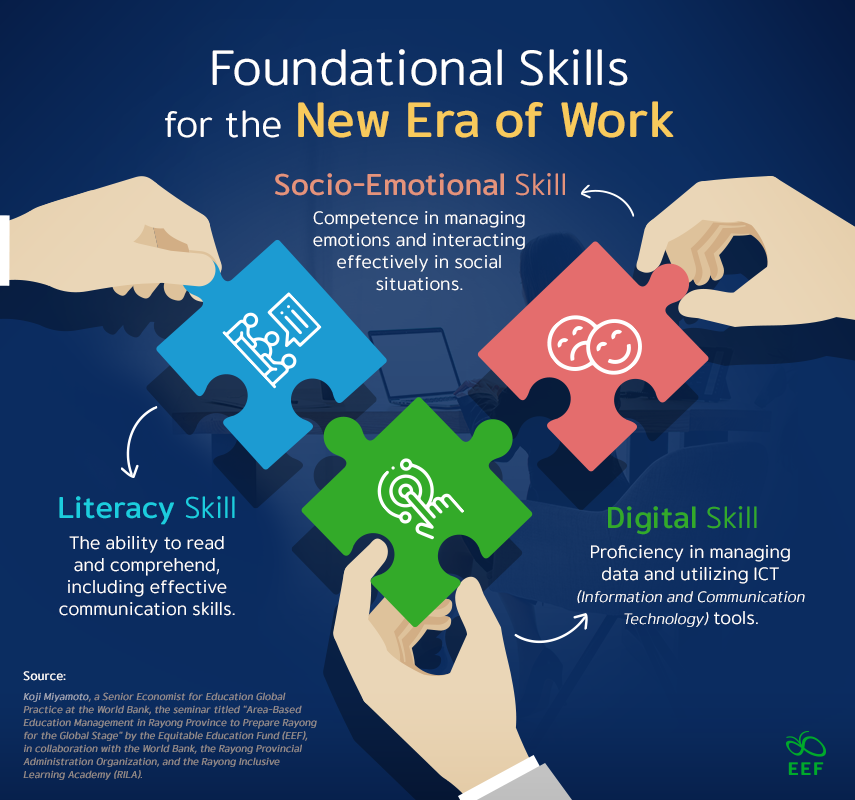
According to the study, ‘Foundational Skills for the New Era of Work’ can be categorized into three main dimensions: 1. Literacy Skill: The ability to read and comprehend, including effective communication skills, 2. Digital Skill: Proficiency in managing data and utilizing ICT (Information and Communication Technology) tools, and 3. Socio-Emotional Skill: Competence in managing emotions and interacting effectively in social situations. Individuals can develop these foundational skills in a progressive sequence, starting from basic literacy skills and progressing to comprehensive understanding and communication. By cultivating a desire for knowledge, understanding information, and synthesizing knowledge, individuals can enhance their capabilities and become in-demand in the job market. This, in turn, enables them to pursue higher-income employment.
From a business perspective, these foundational skills can significantly enhance productivity and innovation. Economists from the World Bank suggest that foundational skills for the new era of work are sometimes more important than specific occupational skills, in certain contexts.
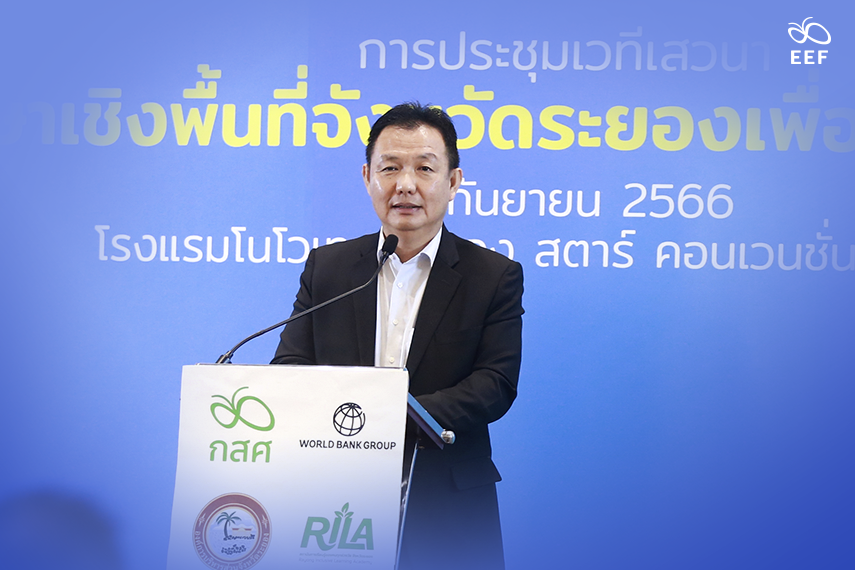
Somsak Paniengtong, a committee member of Area-based Learning Development in Rayong, has outlined three essences in formulating the educational strategic plan for Rayong Province: 1. Reduce educational disparities, 2. Enhance educational efficiency, 3. Decentralize power, and 4. Develop collaboration mechanisms in the region. This implies that the government, private sector, local entities, and the community must collaborate to provide quality education, aiming to make Rayong Province a leading area in “preparing people” for the global stage.

This seminar is a historic moment as education-related individuals from both direct and indirect aspects are converging at this conference for the first time in Rayong Province. The primary question that requires everyone’s attention is, “What direction should Rayong take to develop its educational management?”
Furthermore, if Rayong wants to drive its economy through human development, there must be a space for the working-age population to enhance their skills and achieve higher returns apart from education within the system. Today, Rayong Province, on behalf of RILA, invites decision-makers, system administrators, students, and private sector entities, who will be the destination for integrating individuals into the system, to join the discussion, explore the basic foundations, and collectively set the development direction. This seminar aims to ignite confidence in everyone, in every sector, that the people of Rayong can use education to ‘create’ and ‘set directions’ for the growth of the city, powered by everyone’s potential.

